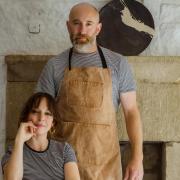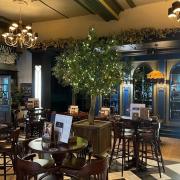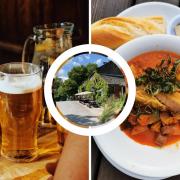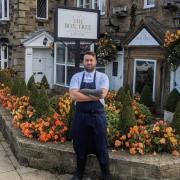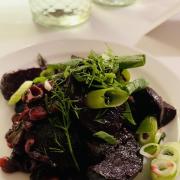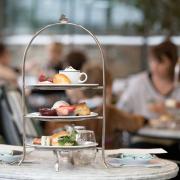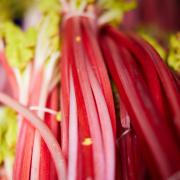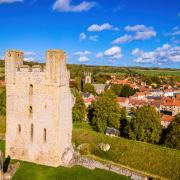A community group in Bedale have risen to the challenge laid down by a television production company, as Paul Mackenzie reports Photographs by Joan Russell
It all started with a curate’s lie. Cath Vickers told a television crew that a social group who met in her church in Bedale made bread. Almost two years later, members of that group, who until then had never even talked about baking together, have a shop, a growing reputation and grand plans to bring their community together.
What followed the curate’s comment is a remarkable story of determination, community action and bread – and it has all been captured on camera.The production company were in the area to make a programme about the restoration of Crakehall watermill but after meeting Cath and the social group, they changed all their plans.They recorded the women’s early bread making efforts, hastily arranged for the crew’s benefit, then found experienced bakers to give advice and encouraged the group to take their bread to market. ‘They suggested we take our bread to the Festival of Food and Drink in Leyburn and we were so proud of ourselves,’ said Carol Brown ,a founder member of Bread Actually. ‘Then we learned how to make bread and we were mortified because we realised how inadequate our first efforts had been.’Over time the bread improved and the group learned the benefits of baking. ‘There is something quite magical about standing in a circle kneading bread,’ Carol said. ‘It opens people up and can be very therapeutic. You can’t rush it, you have to slow right down and have to go at the bread’s pace. If you’re doing that you can’t do anything else. It really centres you and focuses you.‘We’re all so used to multi-tasking these days, but this is one thing that demands you do nothing else and that is what we wanted to take to the community and we wanted to invite other people to be a part of it.’The reaction to their products at markets in Masham, Knaresborough and Crakehall encouraged the group. And the production company – Keo Films, the people behind the River Cottage series – were keen to maintain the momentum, but with dwindling members the project was in doubt.Carol and her fellow baker Valerie Hutchinson were the only members left and neither felt they had the time to take the project the next stage. After much debate they decided to return to the chantry hall and hold weekly sessions to teach others how to bake bread.But the film makers weren’t there simply to record what happened. They arranged a recruitment drive, found premises for the group and even gave them �5,000 to buy equipment.Carol said: ‘They pushed us to go faster than we wanted and it made for a rather tense time, but they had given us a safety net. They said if at six months it wasn’t working they would help us hand everything back but no-one has thought about that. I had no doubt that we would succeed. I knew how good the bread was and how much people enjoyed it.‘People are savvy shoppers these days and they’ll often pay more for superior products. If people knew what was in it they would never buy another supermarket loaf. There really is no comparison between a hand-crafted, slow-proved loaf of real bread and a supermarket loaf.’The Bread Actually shop opened in June at Bedale Station House, next to the Wensleydale Railway line and after a steady first few weeks, the bakery staff – by now used to facing the cameras – appeared on Countryfile and interest soared. The day after the broadcast, when the shop was closed, more than 70 people turned up and throughout the summer holidays they served a stream of people holidaying in the Dales who had seen the programme.The shop now opens five days a week and staff take great pride in using local ingredients – but even the flour from Crakehall, the honey from Leeming and the mustard made in Masham are not the most local products they use.‘We use rosemary and apples from gardens in Bedale,’ Carol said. ‘If people bring things like that along and we can use them, they get a loaf in return. It’s about creating short food chains – using ingredients on our doorstep to provide food to people who live close by.‘It goes back to what we found value in at the beginning, it brings people together. The bread has to do more than just sell, it has to enrich lives.’Cath, the curate who started it all, has left for a parish in Stratford-Upon-Avon but her daughter Suzie is now the group’s only paid member of staff. The 20-year-old is keen to develop the bakery’s community links and she said: ‘I’d never made a loaf of bread before but they wanted someone who was passionate about the community not necessarily a great baker. Since I started, though, I’ve become the world’s biggest bread snob. I go into restaurants and do a Masterchef job on their bread.‘We’re a not for profit organisation and can’t do all the things we want to do with the community yet but once we start to work with social services and run courses, things will really take off.‘We offer a place for people to come along and try something a bit different and to make new friends. The volunteers who come in have really flourished and they’re such a diverse group – we have young mums, an ex-soldier, retired people, a consultant doctor, all sorts of people.’No firm date has yet been set for broadcast but Carol added: ‘Without the production company pushing us we would never have got going but their involvement was a double edged sword. They created opportunities for us and opened a few doors but it is lovely to do a baking shift without the cameras there.‘It was a nightmare at times, too, when they were in the way and we couldn’t do things at times to suit us, and we couldn’t stop and have a chat or swear, or put the radio on. It was just so alien having the cameras there all time, it was unreal to think we were going to be a part of this programme.‘We’ve not really had time to reflect because we’ve been so busy but I suppose it’s quite amazing really. We’ve had our ups and downs and some very hard times but this didn’t exist before and it only does now because everyone has fought so hard.’
It all started with a curate’s lie. Cath Vickers told a television crew that a social group who met in her church in Bedale made bread. Almost two years later, members of that group, who until then had never even talked about baking together, have a shop, a growing reputation and grand plans to bring their community together.
What followed the curate’s comment is a remarkable story of determination, community action and bread – and it has all been captured on camera.The production company were in the area to make a programme about the restoration of Crakehall watermill but after meeting Cath and the social group, they changed all their plans.
They recorded the women’s early bread making efforts, hastily arranged for the crew’s benefit, then found experienced bakers to give advice and encouraged the group to take their bread to market. ‘They suggested we take our bread to the Festival of Food and Drink in Leyburn and we were so proud of ourselves,’ said Carol Brown ,a founder member of Bread Actually.
‘Then we learned how to make bread and we were mortified because we realised how inadequate our first efforts had been.
'There is something quite magical about standing in a circle kneading bread. You can’t rush it, you have to slow right down and have to go at the bread’s pace.'
’Over time the bread improved and the group learned the benefits of baking. ‘There is something quite magical about standing in a circle kneading bread,’
Carol said. ‘It opens people up and can be very therapeutic. You can’t rush it, you have to slow right down and have to go at the bread’s pace. If you’re doing that you can’t do anything else. It really centres you and focuses you.
‘We’re all so used to multi-tasking these days, but this is one thing that demands you do nothing else and that is what we wanted to take to the community and we wanted to invite other people to be a part of it.
’The reaction to their products at markets in Masham, Knaresborough and Crakehall encouraged the group. And the production company – Keo Films, the people behind the River Cottage series – were keen to maintain the momentum, but with dwindling members the project was in doubt.
Carol and her fellow baker Valerie Hutchinson were the only members left and neither felt they had the time to take the project the next stage. After much debate they decided to return to the chantry hall and hold weekly sessions to teach others how to bake bread.
But the film makers weren’t there simply to record what happened. They arranged a recruitment drive, found premises for the group and even gave them �5,000 to buy equipment.Carol said: ‘They pushed us to go faster than we wanted and it made for a rather tense time, but they had given us a safety net. They said if at six months it wasn’t working they would help us hand everything back but no-one has thought about that.
I had no doubt that we would succeed. I knew how good the bread was and how much people enjoyed it.‘People are savvy shoppers these days and they’ll often pay more for superior products. If people knew what was in it they would never buy another supermarket loaf. There really is no comparison between a hand-crafted, slow-proved loaf of real bread and a supermarket loaf.’
The Bread Actually shop opened in June at Bedale Station House, next to the Wensleydale Railway line and after a steady first few weeks, the bakery staff – by now used to facing the cameras – appeared on Countryfile and interest soared.
The day after the broadcast, when the shop was closed, more than 70 people turned up and throughout the summer holidays they served a stream of people holidaying in the Dales who had seen the programme.The shop now opens five days a week and staff take great pride in using local ingredients – but even the flour from Crakehall, the honey from Leeming and the mustard made in Masham are not the most local products they use.‘We use rosemary and apples from gardens in Bedale,’
Carol said. ‘If people bring things like that along and we can use them, they get a loaf in return. It’s about creating short food chains – using ingredients on our doorstep to provide food to people who live close by.‘It goes back to what we found value in at the beginning, it brings people together.
The bread has to do more than just sell, it has to enrich lives.’Cath, the curate who started it all, has left for a parish in Stratford-Upon-Avon but her daughter Suzie is now the group’s only paid member of staff. The 20-year-old is keen to develop the bakery’s community links and she said:
‘I’d never made a loaf of bread before but they wanted someone who was passionate about the community not necessarily a great baker. Since I started, though, I’ve become the world’s biggest bread snob. I go into restaurants and do a Masterchef job on their bread.
‘We’re a not for profit organisation and can’t do all the things we want to do with the community yet but once we start to work with social services and run courses, things will really take off.
‘We offer a place for people to come along and try something a bit different and to make new friends. The volunteers who come in have really flourished and they’re such a diverse group – we have young mums, an ex-soldier, retired people, a consultant doctor, all sorts of people.’
The programme will be broadcast on December 6, 7 and 8 and Carol added: ‘Without the production company pushing us we would never have got going but their involvement was a double edged sword.
They created opportunities for us and opened a few doors but it is lovely to do a baking shift without the cameras there.
‘It was a nightmare at times, too, when they were in the way and we couldn’t do things at times to suit us, and we couldn’t stop and have a chat or swear, or put the radio on.
It was just so alien having the cameras there all time, it was unreal to think we were going to be a part of this programme.‘We’ve not really had time to reflect because we’ve been so busy but I suppose it’s quite amazing really.
We’ve had our ups and downs and some very hard times but this didn’t exist before and it only does now because everyone has fought so hard.’
The print version of this article appeared in the December 2011 issue of Yorkshire Life
We can deliver a copy direct to your door – order online here



